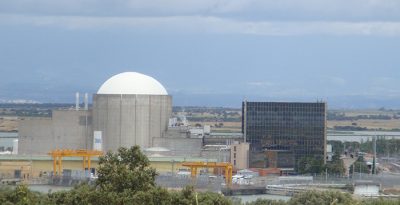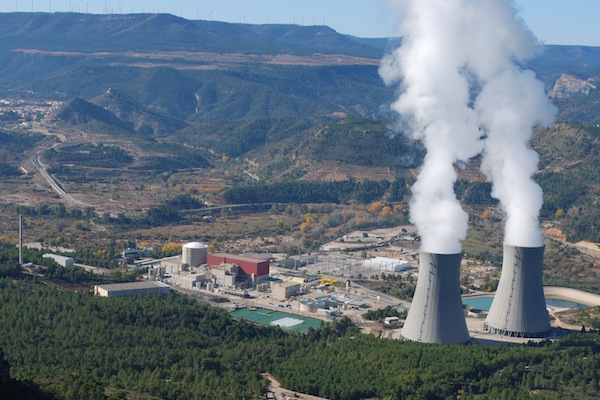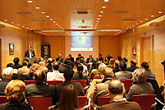The Renewables Foundation appeared on Wednesday before the rapporteurship in charge of relations with the Nuclear Safety Council (CSN), constituted within the Energy, Tourism and Digital Agenda Commission of the Congress of Deputies. Its aim is to ratify the feasibility of shutting down the Nuclear power plants at the end of their current operating license period, which would result in this technology being discontinued by 2024.
This measure is part of the energy policy proposals made by the Foundation in 2015, «Energy as a vector of change for a new society and a new economy», which includes more than three hundred concrete actions to materialize the change of Energy model required by our country and which, moreover, is an opportunity.
In that document, the Renewables Foundation starts from the consideration of «energy as a basic and scarce good that must supersede the economic interests that are generated around it with the aim of recovering the attribute of public utility«. This takes its full meaning when it comes to addressing the issue of whether extending or not the life of nuclear power plants. «The general interests must supersede those of the companies owning these facilities, which would be the only beneficiaries of this extension,» said Sergio de Otto, the Foundation’s patron.
In its document, the Renewables Foundation clearly positions itself in a series of specific issues demanding, inter alia, a Coal Plants Closure Plan involving the cessation of activity before 2025, the ban on fossil fuel prospection and the Closure Plan for Nuclear Power Plants and Waste Management Centers which he outlined before the political groups representatives.
Nuclear shut down in 2024
The Renewables Foundation proposes the scheduled closure of all nuclear power plants considering them «unsustainable, environmentally unacceptable and non-competitive for society» and adds that «nuclear energy is not part of the desirable energy scenario for Spain and, in general, if they are so for the electric sector it is because they benefit from an operation regime and the non-assumption of costs that is not equitable with other sources with which they should compete, » they said in a statement released yesterday.
For Sergio de Otto, patron of the Renewables Foundation, the proposed closure should lead to the implicit development of a technical audit of their status and the definition of the anticipated closure date based on waste generation, safety criteria and the feasibility of their storage. He also believes that their operation must bear all the cost elements in terms of risk coverage and management difficulties, as well as the investments necessary to maintain the maximum degree of security.
Likewise, with regard to nuclear waste, the Foundation maintains the stance that the realization of the ATC only makes sense if it is one more element of the entire plan for the closure and decommissioning of nuclear power plants and should not be considered and decided in any way as long as there is not a planned closure plan of plants previously set.
«Fair Transition» Plans
Sergio de Otto said that the planned closure of the nuclear fleet will also necessarily have to be accompanied by «fair transition» plans in similar terms to those required by the closure of coal. This would involve the dynamization and economic diversification of the areas impacted and the mobilization of private-public investment to create quality employment in more sustainable emerging sectors (renewable, energy efficiency, …).
In answer to the questions asked by the representatives of the different parliamentary groups, Sergio de Otto insisted that «we must and can close the nuclear plants, we must close them because of the enormous risks that their activity entails; for their great vulnerability; for their intrinsic unsustainability, for the unfair transfer of radioactive waste to future generations, due to its linkage to military use, because it is an expensive and unmanageable technology; because it is a technology that increases our dependence; For its opacity; For not being accessible or viable for distributed generation and because it is a technology of the past. «
As for the feasibility of this closure, in parallel to that of the coal plants, the Foundation maintains that this measure makes much sense in the frame of the global change in the energy model. This specifically includes a change of energy culture starting with savings – without having to compromise the services that energy provides us, but rationalizing them – and efficiency, policies with they believe can achieve a wide margin to reduce demand.
«We believe that it is possible because there is a sustainable, socially fairer, competitive and accessible to all countries alternative such as renewable energies. We need to count on distributed generation, simply allowing and boosting self-consumption, promoting the development of mature and manageable renewable technologies, bringing in others in the maturation stage, increasing pumping capacity, relying on biogas and, as necessary, on the combined cycle fleet as a transitional backup, «said de Otto.
Carlos Sánchez Criado
Publicista por la Universidad Complutense. Director comercial de publicaciones técnicas del sector de la energía durante doce años. Director de Energy News Events, S.L. desde 2012 difundiendo información en Energynews.es, movilidadelectrica.com e hidrogeno-verde.es. Y por supuesto, organizando eventos como VEM, la Feria del Vehículo Eléctrico de Madrid.


























